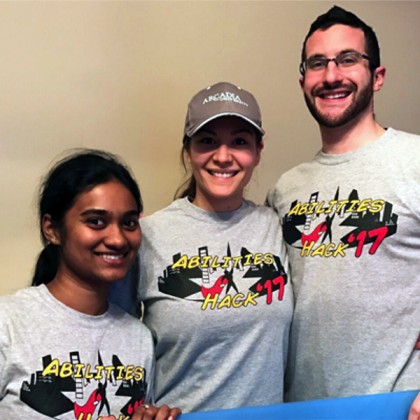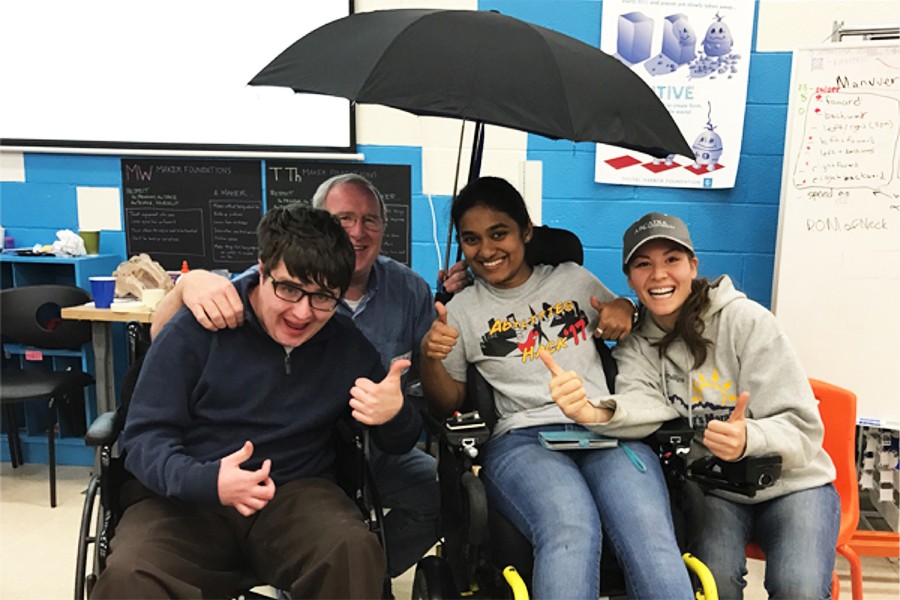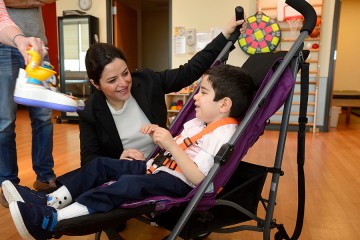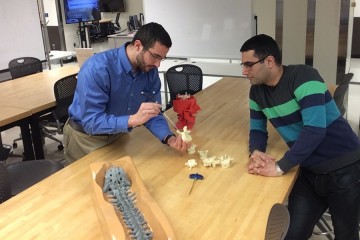Two Johns Hopkins biomedical engineering students won the mobility and transportation category last month at the Abilities Hackathon, an event held for the second year at the Digital Harbor Foundation's Baltimore location.
Team Rain Rain Go Away, which included BME graduate student Sapna Kumar; Center for Bioengineering Innovation and Design graduate student David Gullotti; and Dianne Weeks, a physical therapist with ATI Physical Therapy, designed an umbrella to keep people who use wheelchairs dry in the rain. Their retractable umbrella is mounted on a wheelchair arm and is controlled by a switch.
The team was awarded a cash prize of $1,000, and will be returning to the winners' showcase on Tuesday for a chance to win an additional $5,000.

Image caption: Members of Team Rain Rain Go Away (from left) Sapna Kumar, Dianne Weeks, and David Gullotti
The idea was brought to the team by Ed Slattery, president of FANN—short for Finding a New Normal. The non-profit based near Baltimore provides resources to construct home modifications for families with disabled children and supports the design of accessible tools that make daily living easier.
"Wheelchair users need to be able to independently use umbrellas," Kumar said. "Though this seems like a simple problem, there are currently no wheelchair accessories that can do this."
The team got to work designing a retractable option. Now with the flip of a switch, their umbrella opens to cover the user. Another switch closes it. The team made sure to limit any water dripping on a user's head by designing the umbrella to close in an inverted shape.
Using a motorized car radio antenna as the automated solution, the team designed and built a prototype in a few days. A typical umbrella was attached to the antenna with custom laser cut acrylic pieces, and fastened to the wheelchair with simple zip ties and string.
"We worked through the weekend to bring this idea to life," Kumar said. "It was interesting to watch other teams work enthusiastically and bring some more amazing ideas to life. It was a great place to meet new, like-minded people, and this being my first hackathon, winning was no less exciting."
Kumar and Gullotti studied the intricacies about the product needs of people with disabilities in their Introduction to Rehabilitation Engineering course taught by Scott M. Paul, an adjunct assistant professor of biomedical engineering and physical medicine and rehabilitation. Kumar is a student in the class, and Gullotti, on a one-year gap program from the Johns Hopkins School of Medicine, is a teaching assistant in the proceeding laboratory class.
The Abilities Hackathon, which debuted last year, is aimed at developing technology with accessibility in mind. Other winning projects include an app that enables users to paint hands-free, a technology solution to translate American Sign Language into English, a gripper to help wheelchair-bound individuals reach high items, and a wheelchair controlled by head motion.










